Q: What makes EcoFS different from other field studies?
A: EcoFS has a unique combination of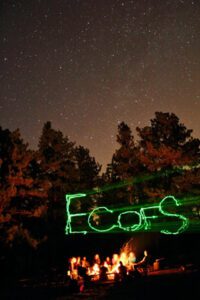 academic rigor and experiential adventure. We take great pride in our educational focus while integrating opportunities to investigate the unique ecosystems of our locations. Students typically remark they learned more in the 21 days on the course than an entire semester at school.
academic rigor and experiential adventure. We take great pride in our educational focus while integrating opportunities to investigate the unique ecosystems of our locations. Students typically remark they learned more in the 21 days on the course than an entire semester at school.
Q: When and how do I apply?
A: The sooner the better, as we accept qualified students on a rolling basis. We do not have a set deadline and accept applications until courses fill. You will need to complete the application and pay a $20 application fee. Students can increase their chances by applying to more than one course (in the summer). Also students are welcome to attend both Caribbean & Colorado courses. Should a course fill we will post an announcement on the application page of the website.
Q. What is the average class size, male-to-female ratio, age range of EcoFS course?
A: Class size of EcoFS courses is limited to around 20 students to ensure a positive learning environment. Typically we have 4-5 staff for each course with a Lead Instructor, a Teaching Assistant, and 2-3 Course Assistants. We consistently receive more female applicants to EcoFS courses and our course gender ratio reflects this with typically 50-75% female to 25-50% male. Our usual age range is between 18-25 but we often have non-traditional students in their 30’s and 40’s.
Q: What kind of college students take EcoFS courses and how are they chosen? What % are accepted? Are their prerequisites?
A: We accept students in any year of study and from any major and college or university. The most common majors are Biology, Environmental Science/Studies, Geography, & Geology. We look for students who are responsible, hard working, and ready to contribute as a 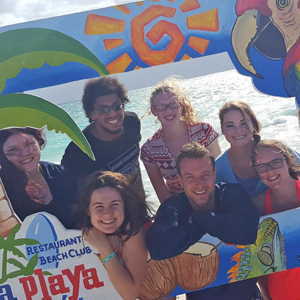 valuable member of the class. Our courses contain a wide diversity of student backgrounds which creates a dynamic and stimulating group environment. Typically about 50-75% of applicants are accepted. EcoFS does not require specific prerequisites to apply to our courses. EcoFS courses are open to students in any year of study and from all backgrounds. No prior research experience is required. However, If you are an upper-level student with strong research background you might find that this course does not meet your higher-level learning expectations.
valuable member of the class. Our courses contain a wide diversity of student backgrounds which creates a dynamic and stimulating group environment. Typically about 50-75% of applicants are accepted. EcoFS does not require specific prerequisites to apply to our courses. EcoFS courses are open to students in any year of study and from all backgrounds. No prior research experience is required. However, If you are an upper-level student with strong research background you might find that this course does not meet your higher-level learning expectations.
Q: How do I choose the right course for me? What kind of background experience is required?
A: Academically the courses are very similar in content with our focus on scientific observation and analysis of the ecosystem. The main obvious difference is the location and related activities. The Caribbean course involves snorkeling and SCUBA diving & coastal walking in a tropical marine environment. The Colorado course involves more challenging hiking and camping in a mountain environment. Neither course requires specific personal experience to participate as activities are appropriate to any experience level but students must have a willingness to “push their comfort zone”.
Q: What if I’m not a college student, or do not need or want the academic credit, can I take an EcoFS course?
A: We accept all applicants over 18 years of age. Any applicant committing to working hard as a student, &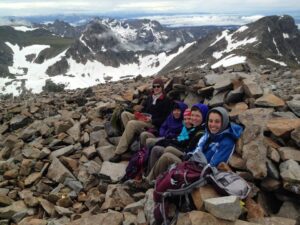 completing assignments as credit-seeking students do, can participate in the course. We have many participants who are not pursuing undergraduate academic credit, recently graduated, or do not need the credits to transfer to their degree. For some students the educational experience of an EcoFS course is more important than the credits.
completing assignments as credit-seeking students do, can participate in the course. We have many participants who are not pursuing undergraduate academic credit, recently graduated, or do not need the credits to transfer to their degree. For some students the educational experience of an EcoFS course is more important than the credits.
Q: Do I need to stay for the entire course?
A: Our courses are busy right up until the last day and we culminate in incredible student presentations of their research. Therefore we require students for stay for the full duration of the course. The only exceptions would be for those students not seeking academic credit.
Q: How hard are these courses, both physically and academically?
A: EcoFS courses are challenging because we pack a whole semester of work and experience into 21 days. 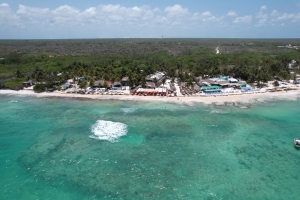 EcoFS days are very full and academic expectations are high so there is not much vacation like time. Physically our courses are highly active but students in reasonable physical condition and health will do fine. Academically our courses do not require any advance scientific knowledge or skills however students must show strong effort with activities, assignments & apply themselves independently on their individual research project.
EcoFS days are very full and academic expectations are high so there is not much vacation like time. Physically our courses are highly active but students in reasonable physical condition and health will do fine. Academically our courses do not require any advance scientific knowledge or skills however students must show strong effort with activities, assignments & apply themselves independently on their individual research project.
Q: What does my tuition (course fees) cover?
A: See costs page for all that is included. Course fees are meant to cover all possible expenses so a student can expect to spend no further money while on course. EcoFS strives for a balance between comfort and affordability and believes our courses are an excellent overall higher education value. We encourage students to shop around for other field courses and when you compare the benefits provided, you will realize that EcoFS is by far the best value.
Q: What are EcoFS cancellation and refund policies?
A: If a student applies and chooses to not take the course they are given a full refund of the application fee. If they are accepted and choose to not take the course they forfeit the application fee. If students are accepted and pay the deposit they are eligible for a 50% refund of the deposit fee if we are notified at least 6 weeks prior to the course start date.
Q: What forms of payment does EcoFS accept?
A: We accept all forms of payment for deposit and balance payments. We accept credit cards through PayPal as well as check or money order sent by mail. The $20 application fee due to submit your application must be paid though PayPal.
Q: Can EcoFS support a gluten-free, lactose-free, food-allergy, vegetarian, vegan, or kosher diet?
A: Absolutely. We strive hard to meet the dietary needs of all students. We know a key to happiness on the course is a well fed student. EcoFS will accommodate any special needs of our students, especially when it comes to food.
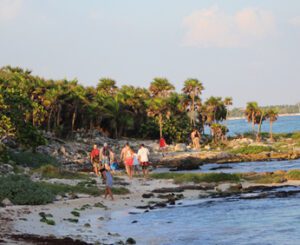
Q: How do I prepare for my EcoFS course?
A: Upon acceptance students receive access to the Student Portal of our website and further course preparation information such as logistics, equipment, paperwork etc. There is no special preparation necessary.
Q: What can I do after my course? Can I work for EcoFS?
A: Upon completion of the course students will have a clearer understanding of their career path which might or might not include scientific research. Students are in-line to receive a letter of recommendation from EcoFS for future graduate school, job, intern applications. Exceptional students are often offered jobs on future EcoFS courses as assistants!
Q: How safe is the Caribbean location?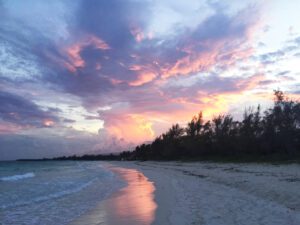
A: Very safe. Xpu-Ha, Mexico is a tourist friendly town along the popular Riviera Maya coast, (about one hour south of Cancun). The course has been conducted safely 16 times over the last eleven years to over 300 students. Our location is on the controlled access, private property of the La Playa Xpu-Ha Beach Club. Playa del Carmen is a major city only 15 minutes away and has excellent medical services if necessary.
Q: Do I need prior SCUBA or snorkel experience? Do I need to be SCUBA certified?
What’s the difference between the SCUBA/snorkel option and Snorkel-only option?
A: No background experience in snorkel or SCUBA diving is required, however students must be competent
swimmers and comfortable in the ocean for up to 1 hour. All snorkel and scuba diving is beginner level and
most students new to snorkeling and SCUBA 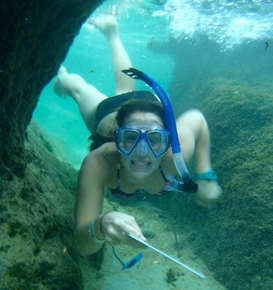 typically do very well on this course. You have a choice between a Snorkel-only option or a Snorkel & SCUBA option. The two options are the exact same in academic focus and topics. The purpose of the Snorkel-only option is for students who prefer to not SCUBA or cannot obtain certification. For all info regarding SCUBA & snorkeling visit this page: SCUBA/snorkel info
typically do very well on this course. You have a choice between a Snorkel-only option or a Snorkel & SCUBA option. The two options are the exact same in academic focus and topics. The purpose of the Snorkel-only option is for students who prefer to not SCUBA or cannot obtain certification. For all info regarding SCUBA & snorkeling visit this page: SCUBA/snorkel info
Q: What are the facilities like?
A: EcoFS is thrilled with our Caribbean course location at Xpu-ha. We are on the property of the of the La Playa Xpu-Ha Beach Club. We also have a private Xpu-Ha/EcoFS Field Research Cabana for studying, research & meeting. For accommodations students choose between an option of beach bungalow rooms or beach tent camping. The bungalows are hostel-like, triple occupancy rooms and have comfortable beds, decks, AC & hot showers. The tent camping is in a beautiful private location under the a protected palapa and adjacent to the bungalow rooms. Spacious tents are provided and campers have access to bathrooms and hot showers. Students may bring their own tent if desired. Camping is very easy and beginner level and requires no prior experience. We have a private, securely locked storage room for all valuables.

Q: What is the food like?
A: Excellent! We have a varied arrangement to ensure everyone’s important food needs are met.
We enjoy an all-you-can-eat buffet brunch at the La Playa Xpu-Ha Beach. Lunches are prepared by the group out of our field cabana. Dinner is incredible as we hire a local restaurant owner and gourmet cook, Imelda, to prepare one of her authentic, healthy and plentiful dinners. And we get to eat with our feet in the sand steps from the ocean. Endless snacks are also provided to ensure no one goes hungry! EcoFS is able to accommodate any dietary restriction.
Q: Will I be able to communicate with my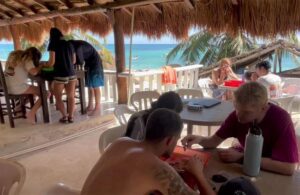 family on the course?
family on the course?
A: Yes, cell phones work perfectly in Xpu-ha and wifi is available
Q: Is transportation to Mexico covered?
A: No. Students must arrange and pay for the airfare to and from Cancun International Airport. Once in Cancun all transportation to/from the course location, and during the course is included.
Q: Do I need to be able to speak Spanish?
A: No. All instruction is in English. Most locals speak English well and EcoFS has bilingual staff to assist in case language is ever an issue.
Q: Do I need prior camping experience?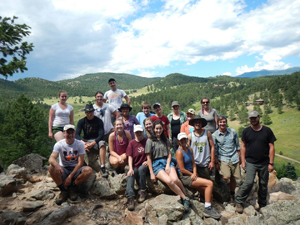
A: No. This is very easy “base-camp” camping meaning you do not carry tents and other gear. We set up our tents on on day one and then leave them. We have access to Cal-Wood Lodge for hot showers, laundry & wifi. This is a great experience for first-time campers as well as experienced campers.
Q: Is it safe to camp in the mountains of Colorado?
A: Yes it is very safe. We discuss safety issues on the first day of the course and continually remind students of proper safety procedures. We have had no major safety incidents with over 600 students in 16 years of programming.
Q: How difficult is the hiking?
A: Hiking can be challenging as we cover between 2-6 miles each day over rugged terrain at an elevation of about 8,000 feet. We travel slowly, though, with a focus on academic observations. Students must be physically fit to participate in this course.
Q: Are the transportation costs covered?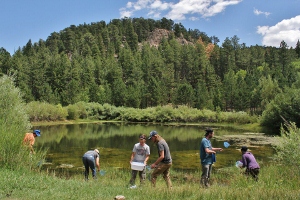 A: Students must arrange and pay for their transportation to Boulder, Colorado. Most students fly to Denver International Airport and then take the easy public bus to Boulder. Students can also drive on their own. In Boulder, EcoFS provides a hotel room, breakfast & transportation to the course site. More details on arrival are given upon acceptance.
A: Students must arrange and pay for their transportation to Boulder, Colorado. Most students fly to Denver International Airport and then take the easy public bus to Boulder. Students can also drive on their own. In Boulder, EcoFS provides a hotel room, breakfast & transportation to the course site. More details on arrival are given upon acceptance.
Q: Will I be able to communicate with my family on the course?
A: Yes, although cell phones only work in limited locations but there is a landline phone available at the Cal-Wood Lodge for emergencies. Cal-Wood has wifi available.
Q: What is the food like?
A: The best camp food you will ever have. we take great pride in making nutritious and plentiful food for hungry campers and accommodate all dietary restrictions. Endless snacks ensure no one ever goes hungry on an EcoFS course.
Q: Is alcohol allowed on the course?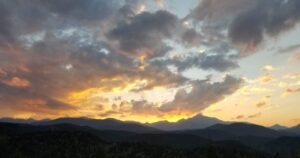 A: No. Alcohol and any recreational drugs are strictly forbidden at Cal-Wood and on this course. EcoFS strives to make a safe and enjoyable learning environment for all.
A: No. Alcohol and any recreational drugs are strictly forbidden at Cal-Wood and on this course. EcoFS strives to make a safe and enjoyable learning environment for all.
Q: How do I get myself and camping equipment there?
A: Most students fly to Denver International Airport and check their luggage. From the Airport most take the reliable public bus which drops you in Boulder. You are welcome to drive your personal vehicle and Cal-Wood has safe parking. We have hotel rooms reserved in Boulder for the night before the course starts and the last night of the course.
ECOFS COURSES ARE OPEN TO STUDENTS FROM ANY UNIVERSITY/COLLEGE AND DEPARTMENT/MAJOR FOR TRANSFER CREDIT FROM THE UNIVERSITY OF MONTANA.
EcoFS courses are ENST 391: Caribbean Ecosystem Field Studies or ENST 391: Colorado Ecosystem Field Studies. These are rigorous university level courses with high academic expectations and are approved for 3 undergraduate semester transfer credits through the Environmental Studies Program of the University of Montana at Missoula (UM). EcoFS is an official academic partner to UM. Steve Johnson, EcoFS Director, obtained a Master of Science from the Environmental Studies Program at UM in 1995.
Over 250 United States and Canadian universities & colleges have approved EcoFS courses for academic credit. For a full list of universities and colleges that have accepted credits in the past, view this pdf file: EcoFS University & College Partner List. PLEASE NOTE, every department, major, and student situation is unique. Therefore prospective students must confirm with their university department if and how these credits will transfer for their degree. University & college officials/advisors are welcome to contact Steve at steve@ecofs.org to discuss the course. Recent graduates, graduate students, or other students not seeking undergraduate academic credit are welcome to take the class. Full course syllabi are available to download in the links below.
Students complete a 1-page class registration form with University of Montana, there is no enrollment to UM. Upon completion of the course students request a transcript from an online database (National Student Clearinghouse) to transfer the credits from the University of Montana at Missoula to their institution. In addition to academic credits this course provides an exceptional career building experience and successful students are in-line to obtain a valuable personal reference and/or letter of recommendation for future internship, job or graduate school applications.
EcoFSLOVE scholarship fund.
EcoFS has a limited number of scholarships for students who meet at least one of the following criteria. These criteria are ranked in importance.
1. A student of an underrepresented minority group such as African American, Native American, Latino.
2. An international student or a student attending a non-US university.
3. A student with significant financial hardship.
Scholarship amounts range from $250 – $750. To apply for an EcoFSLOVEscholarship please send a separate email letter detailing your situation to EcoFS at steve@ecofs.org after you submit your course application. Scholarship amounts are deducted from the course balance payment.
Other Funding Sources:
Students have been successful in the past with a variety of funding sources. You might need to be creative and persistent but there are funds out there for students.
Direct Financial Aid:
If a student receives financial aid at their school it is possible to establish a “consortium agreement” with their school and the University of Montana to apply that aid to this course. Students must first check with their school’s Financial Aid Office (FAO) to discuss their unique aid situation. If a students’ FAO determines that they are eligible to recieve financial aid for this course then the student must contact EcoFS to coordinate the consortium agreement with the University of Montana.
529 college accounts are typically eligible for use to pay for this course. Unfortuntaely VA benefits are not able to be used unless made directly payable to the student.
Parents & Family:
Parents and family are by far the most common source of funding for this course. Think about how to sell the course to them and the value it will provide for your education. This course has direct career benefits that will pay off in the future for students. Compare the cost of this course with your normal education costs at your university and parents (or grandparents, aunts, uncles) will see this is an affordable, worthwhile value. Family members are welcome to contact Steve Johnson, EcoFS Director, to discuss the value of the course.
External Scholarship funds:
There are many outside scholarships available, though applying for these will take a good amount of advance planning. We recommend that you speak with your academic advisor or the Study Abroad office (if choosing the Caribbean course) at your home campus for more information and possibilities. Make sure to do an exhaustive online search as there are many consolidated lists of scholarships on the web.

